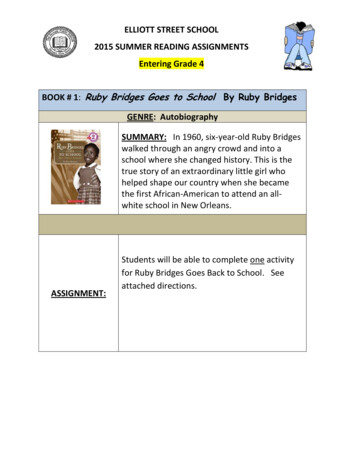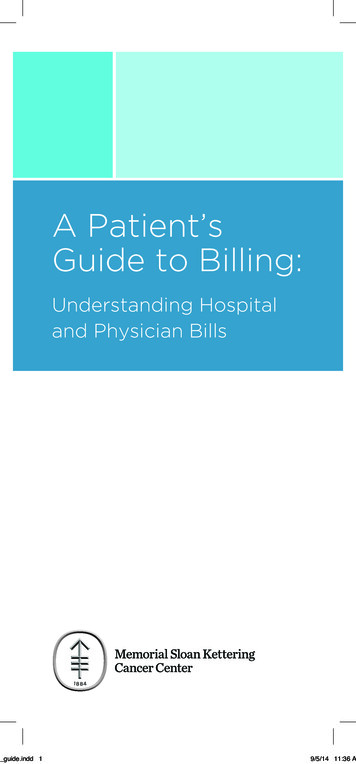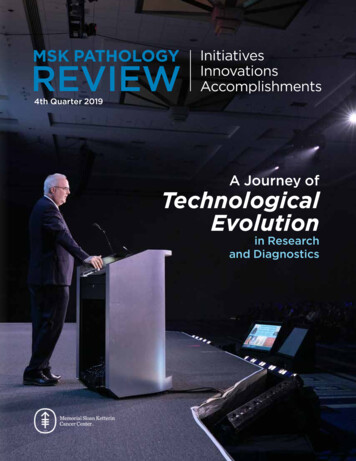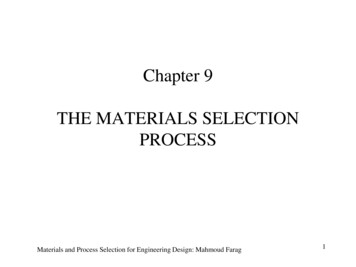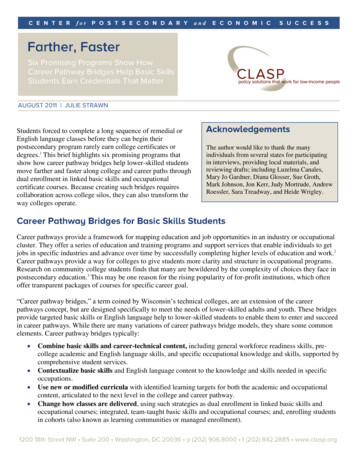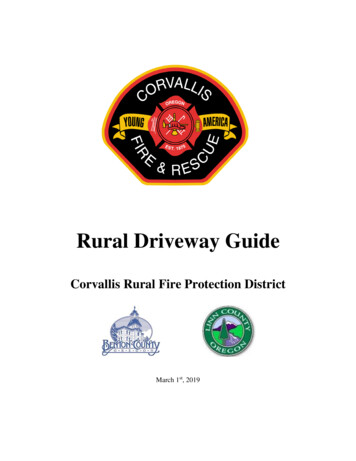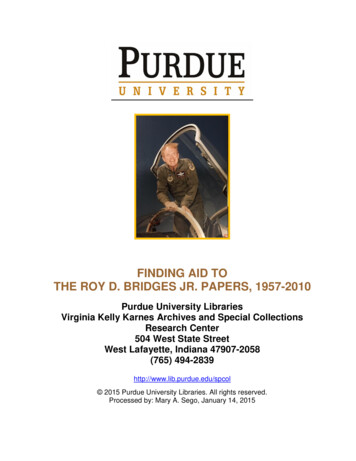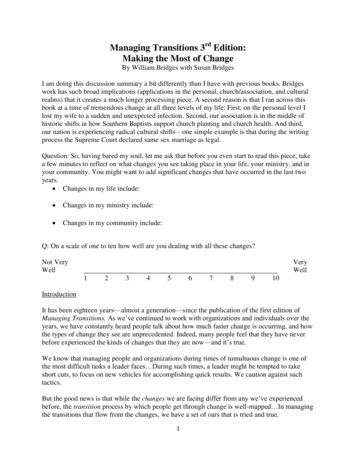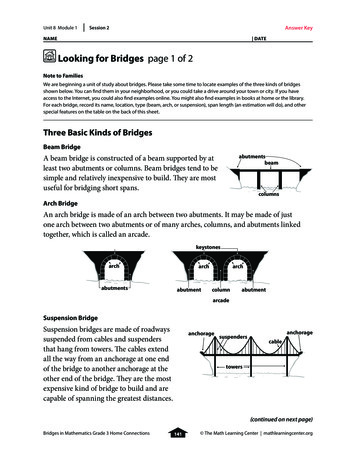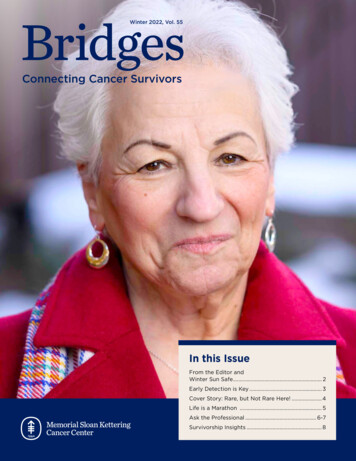
Transcription
BridgesWinter 2022, Vol. 55Connecting Cancer SurvivorsIn this IssueFrom the Editor andWinter Sun Safe. 2Early Detection is Key. 3Cover Story: Rare, but Not Rare Here!. 4Life is a Marathon . 5Ask the Professional. 6-7Survivorship Insights. 8
From the EditorBy Eileen F. GouldNo matter your personalor religious beliefs, theholidays and end ofthe year are often atime of reflection.Cancer care doesn’t stopduring a pandemic orduring the holidays: It’s a24/7 World of Cancer.This is the secondholiday season during thelong and arduous ongoingCOVID-19 global pandemic— something that is hard for most of us to fathom.Memorial Sloan Kettering Cancer Center has remained fullyfunctional during these difficult times, and there are somany people to extend gratitude toward at this institution.Patients, staff, and volunteers are all in the journey ofcancer survivorship together. Zoom and telemedicine haveallowed for new ways to stay connected with medicalteams or family and friends, and resources have expandedaccessibility to the convenience of home. In a challengingtime, we are thankful for the ways we have been able toconnect and to continue reaching all of you in the Bridgescommunity.We here at Bridges wish everyone a safe and pleasantholiday season and a brighter and healthy New Year for 2022.If you would like to share your story or receive anemail copy of Bridges, please visit www.mskcc.org/bridges. Bridges is now printed on recycled paperand, as always, is available online.Winter Sun SafeBy Parisa Momtaz, MDAlthough winter months can bebrutally cold, the sun continuesto burn bright, and along withthat comes constant exposurefrom UV rays.The (UV) light of dayduring fall/winter can bejust as taxing on the skinas summer days, and itis important to continuesun protection during thecolder season, whether onan ordinary day runningerrands outdoors or ifengaged in outdoor winteractivities or sports.Even though the sunshine is notas hot or even visible in the coldermonths or on overcast days, theclouds are no obstacle — UV rays can2 Bridges Winter 2022still penetrate through them. UVBrays mostly contribute to sunburnsand can be reflective on surfaceslike snow or ice. UVA rays can alsopenetrate through glass, so drivingor even being indoors does notconfer protection.Winter sun-safety measuresinclude sun protective clothing likelong sleeves and pants. Hats willprotect the scalp, and sunglasseswill protect the eyes. Continue towear sunscreen (SPF 15 or higher)on the face, neck, and hands, anddon’t forget the ears. Some dailyfacial moisturizers may alreadycontain sunscreen.Just because the heat of thesummer may be gone, it doesn’tmean the sun isn’t burning justas bright in the colder seasons.Your skin is vulnerable year-round.Please remember to practice sunprotection during all four seasons!Parisa Momtaz is a medicaloncologist with dermatologytraining. She treats patients withadvanced melanoma at MemorialSloan Kettering Cancer Center’sWestchester location. She hasalso helped establish a melanomasurvivorship clinic at the MSKWestchester location.
Early Detection Is KeyBy Helen SanudoWith a shopping cartfull of Christmaspurchases, my cellphone rang. I pickedup the call and became very nervouswhen I heard it was my gynecologist.He revealed that cancer cells werediscovered on a recent procedure I’dhad done. My doctor advised me tocall an oncologist as soon as possible.What do I do with all thesepresents in my cart? Do I leave ordo I purchase them? Not knowingwhat procedures I may need beforeChristmas, I decided topay for them. Luckily, I had forgottenmy eyeglasses that day and was onlywearing sunglasses. They masked mytears as I checked out at the register.From my car, I called my husband torelay the bad news. Once home,he consoled me as we thought ofhow to tell our 12-year-old son thenews when he came home fromschool. Since I lost my brother-in-lawto cancer a few months earlier, weknew our son was well aware of theseriousness of a carcinoma diagnosis.My husband researched theprognosis of uterine cancer onthe Internet. When he found outthat it had a 95% cure rate, we felta sense of relief. It made tellingour son a whole lot easier thateverything should be alright. Aftermy hysterectomy, I did not needfurther treatment because the cancerwas caught at stage I. I went backto life as usual — busy with PTAresponsibilities, taking care of myhome, and going on vacations whereI could enjoy my favorite hobby,photography.When our son was in high school,I decided to become a volunteer formelanoma awareness. Years later, Iwas diagnosed with melanoma underthe toenail, a very rare form of thiscancer. While I had sun-damaged skinHelen Sanudo retired from25 years of federal service toadopt her son and become astay-at-home mom. One ofher many positions in the PTAallowed Helen to use her favoritehobby, photography, by takingpictures of school events andsubmitting them with articles toa local newspaper. She lives inNew Hyde Park, New York, withher son and husband, who isalso retired. Besides her currentvolunteer work for melanomaawareness, Helen enjoys baking,gardening, and scrap booking.on my arms and legs for decades,those areas remained benign.Now, I had a malignancy under thenail. This was a devastating blow tome and my family. We all knew howdeadly melanoma was.Before knowing what myprognosis might be, I prayed that Iwould at least be able to see my songraduate from college in a year.With the amputation of the top partof my toe, I was left cancer free withno need for additional therapy.How lucky can one be to havesurvived two cancers? I feel myaction to seek treatment as soonas I noticed something differentwith my body was the secret tobeing able to survive both cancers.Early detection is key!One in five people will bediagnosed with some form of skincancer in their lifetime. Melanoma,while less common than some otherskin cancers, is more dangerousbecause it advances and spreadsquickly if not treated early. This formof cancer can originate anywhereon the body including the palms ofhands, soles of the feet, and underthe nails of both. My volunteer workwith melanoma awareness helped meseek the proper treatment at an earlystage. Otherwise, I would not haveknown that dark streak under my nailwas actually cancer.Did you realize you shouldwear sunscreen all yearlong on the exposed partsof your body? Water andsand at the beach reflect thesun’s rays — snow does thesame in the winter. Do youremember to guard yourears, scalp, and the tops ofyour hands from the sun?Being free from uterine cancerfor eleven years and melanoma fortwo, I am grateful for every day thatI have. Oh, by the way, my prayerwas answered. I saw myson graduatefrom college on Mother’s Day.What a wonderful gift!3
Cover StoryRare, but Not Rare Here!By Diane Halkowiczwho are never too busy to answerquestions, find solutions, and walk methrough my concerns. I could not havemade it through without help from allof them, most of all, from God.Now I explore ways to stay healthy,eating nutritiously and exercisingalmost daily. MSK’s Integrative MedicineService has been a blessing! (Checkthem out if you haven’t yet.) As aresult of the cancer procedures, I lost40 pounds: How terrific is that? I’mback to the weight I was at 28 years old(I’m now 74); I have a lovely wardrobe(my pre-cancer clothes had to bereplaced), and I have lots of shoes.Diane Halkowicz is busy thesedays — enjoying exercising andplanning to start quilting again.She says, “I quilt by machineand by hand. Hand-quiltingtakes longer, but it’s muchmore rewarding.” Diane lives inbeautiful central Pennsylvaniawith her husband of 54 years;they are high school sweethearts.Acancer diagnosis is scary.I couldn’t hide my feelingsof fear; I was weighing lifeand death alternatives,until a radiologist admitted notknowing enough about my cancer.He suggested I make an appointmentat Memorial Sloan Kettering CancerCenter. He was my saving grace: Hissuggestion prompted my decision to“choose life.”A lump on the back of mytongue was surprisingly discoveredwhen I went for a colonoscopy; theanesthesiologist looked in my mouthpre-procedure and saw a large tumor.I had two surgeries within months:the first (not at MSK) was to biopsythe tissue/lump, which was verifiedmalignant: hyalinizing clear cellcarcinoma of the back of the tongue.We were told this was a rare cancer.At MSK, my husband asked thedoctor if my cancer was, indeed, rareand was told, “It is a rare cancer, butit’s not rare here.”So, at MSK, I had a mandibulotomy.This required cutting through mymandible (lower jaw) so my face couldbe opened up. The portion of the backof my tongue (where the residualtumor resided) was amputated toensure that the tumor was entirely4 Bridges Winter 2022removed. The floor of my mouth waslifted to expose glands and nervesrelated to the surgery. My neck wasincised to access lymph nodes thatwere possibly affected. Finally, I hadplates screwed into my chin to holdmy face together. I woke up with adrain in my neck, lots of stitches, and atracheotomy. I could not eat or speakfor days. My surgery left me with someinvisible limitations. In a short time,my scars became barely noticeable,an outstanding credit to the surgicalteam. The alterations inside my mouthmake eating and speaking difficult,but these changes are not obvious.My brain had to adjust to the newmechanics, but we manage: mytongue, my brain, and me.Before my surgery, I was happilybabysitting our grandson on weekdayswhile his parents worked, from thetime he was six weeks old to 26months old. I was enjoying quilting,baking, and our orange Maine Cooncat. I was 72 at the time.My husband and I now share therewards of a 54-year-long marriageand four loving children with their ownfamilies. They are our family support.We have been lifted up with manyprayers. I have the security of care froma dedicated surgeon and psychologistMy advice:Never think yourdarkest days willdefine your future.It may just be that, in time, thebest is yet to come. So, we maketrades. I may eat differently, buton the other hand, shoes arenice — especially red ones.LIVE EXERCISE CLASSES WITHMSK EXPERTS — FROM HOMEAfter cancer treatment, manypeople see changes in their bodymass, muscle strength, and bonehealth. With Memorial SloanKettering’s Integrative Medicineat Home membership program,a team of clinical fitness andmind-body instructors will guideyou to having more energy,more muscle strength, and moremotivation. Enjoy a variety ofexercise and wellness classes fromwherever you are. Connect withthis online community of cancersurvivors today. Learn more andregister online at MSK.org/AtHomeor call 646-888-0800.
Life Is a MarathonBy Tony GonzalezI have been an endurancerunner for most of my life.I ran my first marathon when I was 15in Monmouth County, New Jersey. I ranthe New York City Marathon almost 20years ago (in 2003), and I am runningit again this November as a cancersurvivor. *This issue of Bridges went topress prior to the 2021 marathon.In March 2020, just as the COVID-19pandemic locked down New York City,where I live, I was diagnosed withhigh-grade, stage II/III, muscle invasivebladder cancer and began treatmentwith an amazing team of doctorsat Memorial Sloan Kettering CancerCenter. I underwent three months ofchemotherapy and immunotherapytreatments during the summermonths of the pandemic and then hadneobladder surgery on October 1, 2020.The surgery involved the removal of mybladder and the construction of a newone using a piece of my small intestine.My prostate and lymph nodes in mypelvic area were also removed. (Priorto my surgery, I began a five-monthcourse of treatment with blood thinnersto address a blood clot in my iliac veinand to prevent any new blood clotsfrom forming post-surgery). Needlessto say, most of 2020 was an incrediblychallenging year for me, not onlybecause I lived in an area with some ofthe highest numbers of COVID-19 casesand deaths, but also because of mycancer diagnosis.While undergoing chemotherapyand immunotherapy treatments duringthe summer, I continued to run. WhileI was not able to run nearly as manymiles as I did pre-cancer due to thefatigue caused by chemo, I endured.Running gave me much confidence andstrength as well as a sense of peaceduring a very difficult time. After mycourse of chemo treatments ended inJuly, I had a couple of months “break”before undergoing my surgery.It was then that I decided I wouldrun the New York City marathonagain, with the goal of doing it thefollowing year in 2021. As my energybegan to increase, I was able to againdo longer and longer runs, and bySeptember, I was doing eight and10-mile runs and averaging 30 milesper week. I had also continued weighttraining throughout my entire cancertreatment, even while undergoingchemo. “Strength and endurance” wasmy mantra, and I believe it helped metremendously during my post-surgeryrecovery. Today, I feel stronger andhealthier with every passingday. I’m getting used to thenew bladder and havebeen able to resume allnormal activity. And thebest news is the biopsypost-surgery showedno physical evidence ofthe cancer spreadingbeyond my bladderand, most recently, mythree-month postsurgery scans showedno visible evidenceof the cancer havingspread. I can say, withconfidence, I am nowcancer free!With theNew Year, I beganslowly rebuildingmy endurance andresuming longerand longer runs,with the goalto completethe New YorkCity marathonthis comingNovember2021, two daysbefore my56th birthday.Tony Gonzalez is an artistcurrently living in New York Cityand Hudson, New York.In addition to working as a fineart photographer, Gonzalez hastaught photography for over25 years, including at TheCooper Union, Pratt Institute,and New York University. Since2002, Gonzalez has beenteaching full-time at QueensCollege, City University NewYork, and is currently a tenuredprofessor. Gonzalez is also anavid endurance runner andrecent cancer survivor.5
Ask the ProfessionalSurvivorshipIncludes Anxietyand DepressionBy Marie Barnett, PhDAre cancer survivors, as a young adultor older adult, at greater risk foranxiety and depression than others?Cancer survivors of all ages experience normal challengesthat may occur throughout the stages of life, but aftera cancer diagnosis, they may experience new normalchallenges. The experience of living with and livingthrough a cancer diagnosis and treatment can increase anindividual’s level of anxiety and depression compared withthose without cancer experience.Cancer of any site is most frequently diagnosedamong people ages 65 to 74. Notably, about 70,000adolescents and young adults (AYAs) ages 15 to 39 arediagnosed annually — which makes up about 5% of allcancers. AYAs uniquely face numerous life changes anddevelopmental milestones at a pace faster than olderadults, making the impact of cancer potentially moreintense, significant, and disruptive — particularly onmental health.What is anxiety and depression?Anxiety and depression fit under the umbrella of mentalhealth, which is defined by our emotional, psychological,and social well-being. Mental health is impacted bybiological factors, life experiences, and family history.Anxiety disorders are the most common group of mentalillnesses in the US, and about 7% of US adults havereported at least one major depressive episode.While both worries and sadness can be normaland healthy, anxiety can lead to excessive nervousness,fear, apprehension, and worry — and impede our dailyfunctioning and goals. Similarly, depression can range frommild to severe and include feeling sad, a loss of interestin activities, changes in appetite or sleep, fatigue, anddifficulty focusing. Some describe depression as seeingthe world through blue-tinted glasses, where everythingaround you is a shade blue.6 Bridges Winter 2022Marie Barnett, PhD, Clinical Psychologist atMemorial Sloan Kettering Cancer Center, has workedin the field of psychosocial oncology for over fiveyears. She joined MSK’s Departments of Pediatricsand Psychiatry & Behavioral Science in 2017 andworks with children, adolescents, and young adultsfrom diagnosis into survivorship.Does depression or anxiety lookthe same for every cancer survivor?The symptoms and impact of anxiety and depression canbe unique for every survivor. As a psychologist, I work withindividuals to help them understand, acknowledge, andlearn to regulate their own spectrum of emotions. We allfeel worried or sad sometimes — but is it getting in theway of your goals, taking away from your relationships, orimpacting your personality? As a cancer survivor, anxietyabout health and your body may present differently thansomeone without experience with a serious medicalcondition. Acknowledging this and giving yourselfvalidation for your experience and noticing when you mayneed more support is important. Additionally, anxiety anddepression are brain-based disorders, and can benefit frompsychiatry interventions, including medications.One approach to a deeper understanding of yourindividual emotional states is by comparing yourself toyourself. What is your level of anxiety at different times ofthe day, week, or year? Do you notice patterns in your ownemotional states in different situations? Try monitoringthis over a few days or weeks. Notice what about yourenvironment or your own types of thoughts might impactyour emotions. Be curious about what you can controland what you cannot control.
But I should be happy! I should be grateful!I commonly hear phrases like:“I should be ”“I should feel ”“I should be happy. I don’t have cancer anymore.”“Why do I feel upset or down when people say,‘You look good’?”It is important to validate your own feelings and explorewhere these comments of comparison, assumptions,and expectations come from. During and post-treatmentyou may be faced with ongoing changes in your values,goals, and most importantly, what you expect of yourself.Depression and anxiety may even increase post-treatment.Some experience this because they are not focused solelyon medical treatment and are required to manage theirpre-existing life and responsibilities outside of cancertreatment while also processing what they went throughphysically and emotionally during treatment.What can I do for myself if I’m feelingmore anxious or down?Be honest with yourself and prioritize your mental healthlike you do with your physical health. Make a list of whatrecharges your battery (e.g., friends, activities, exercise)and what drains your battery (e.g., social media, workschedules, poor boundaries). Identify the things thatyou can control versus things that you cannot, and tryfocusing on the areas in your life that you can control.Many benefit from using cognitive tools learned intherapy (challenging our thinking, problem-solving),mindfulness (acceptance, living more in the moment),or behavioral tools (setting schedules or daily goals,action-oriented skills).Acknowledge that we are not meant to do everythingalone. Approach your family and social supports to ask forhelp, and if symptoms are persistent, seeking professionalsupport is valid, appropriate, and recommended.Why might the COVID-19 pandemic,holidays, or other events impact orincrease anxiety and depression?There are many reasons these aspects of our environmentor the time of year may impact us emotionally. TheCOVID-19 pandemic presented a drastic shift in our dailylives and living and greatly reduced social interactions.For many survivors, this can trigger memories of isolation,thoughts of mortality, and fears during their cancertreatment. Additionally, holidays or anniversaries can addmore stressors, including navigating family dynamics ornegotiating expectations of ourselves and others.I would like to talk with someone furtherabout my feelings of depression or anxiety.Who should I get in touch with?If you would like to connect with a mental health provider,reach out to your medical team or social worker for areferral to an MSK provider or program or for assistanceidentifying an appropriate community resource orprovider to address your unique needs. There are manyways to address and improve our emotional well-being,including talk therapies, medication, and integrativemedicine approaches.Resources for Life After Cancer (RLAC)MSK Counseling CenterRLAC welcomes survivors to participate in programsthat encourage healing through education and supportto live well after cancer. Please see the online calendarat: MSKCC.org/SWcalendarCounselors at Memorial Sloan Kettering Cancer Centeroffer services for individuals, couples, and families.Our counselors, which includes both psychiatristsand psychologists, are also available to patientsduring their hospital stay.Phone: 646-888-0100Mindfulness Classes fromMSK’s Team of Experts:Mind-body practices, including meditation, yoga, andtai chi, can help reduce the impact of anxiety anddepression in your daily life. MSK’s Integrative Medicineat Home membership program offers online mind-bodyclasses you can enjoy from wherever you are. Connectwith our online community of cancer survivors and learneffective self-care tools to care for yourself.Join online today at MSK.org/AtHome orcall 646-888-0800 to learn more.Teen and Young Adult ProgramThe Teen and Young Adult Program at MSK offersservices to decrease isolation and improve connectivitybetween patients and their peers. For more informationabout the program or to join our private socialmedia platform, The Lounge, please contact us attyaprogram@mskcc.org7
Survivor Insights: TelemedicinePatient EditorEileen F. Gould“There has been a huge benefit for me. I drive four hours ineach direction to get to Memorial Sloan Kettering Cancer Center.So, every telemedicine visit has saved me eight hours of driving!I wish that I had done a test run with my computer equipmentbecause it didn’t work effectively until I switched from my phoneto my laptop. I spent a year doing Zoom meetings at work,which allowed me to get more and more comfortable with thistype of communication before my first telemedicine visit. I woulddefinitely use telemedicine inthe future. I enjoyed the visit.I felt that the communicationUsing telemedicine waswas nearly as personal andbeneficialbecause I was afraidcomprehensive as antotravelduringthe pandemicin-person visit, and it savedbutwantedthecomfortofa lot of commuting time.speaking with my doctor. Don’t— Robertlet it bother you that it’s atelemedicine conference. Seeingthe doctor is very reassuring. Iwould have no problems usingtelemedicine in the future as ittakes me quite a while to travelIt was great to still beto the appointment and wouldable to have the appointmentssave me the expense of parking.during the heart of the pandemic,which kept my family and my — Markmedical team safe! Try it out; it’sgreat if you live far [away] to beable to still see your medical teamand get the informationneeded without the timeand cost of the commute toIt saves a trip to the office,New York City. It’s alwayswhich reduces any health risksnice to see your medicalwe may encounter by being outteam face to face, however,in public. It is very convenientwith bad weather and theand equally effective, so longcommute, this will still workas a physical examination is notfor the future.required. I wish I was given the— Alexoption sooner. If you can replacean office visit with telemedicine,do it!”Advisory CommitteeWendy BonillaJoanne Candela, ANP, MPHStacie Corcoran, RN, MSZana Correa, NPLauren DeMarzo, MSHCJames Fetten, MDJudith KelmanEmily McCormackNick MedleyNirupa Raghunathan, MDLarissa RegalaClare ThomasSeeta Verron, NP““”Managing EditorAlexandria WoodsideProduced by the Departmentof Marketing & CommunicationsBridges is a publication of theCancer Survivorship Program at MSK.”“”— NicoleConnectionsMSK’s online community forpatients and caregivers. It providesa venue for conversations, support,questions, and companionship.To register, visit:www.mskcc.org/connectionsPatient Support ProgramRising Voices“Something to Sing About”Rising Voices is a lively singinggroup open to MSK patients,caregivers, and survivors.Rehearsals are held via Zoom.Rising Voices is a free andsupportive program sponsoredby Integrative Medicine andVolunteer Resources.To join, please go to our websitewww.mskcc.org/RisingVoices.Scan the QR code to bedirected to the Bridges websiteand find this issue online.Interested in sharingyour story or receivingan email copy?Please visitwww.mskcc.org/bridgesPrinted on recycled paper.
as bright in the colder seasons. Your skin is vulnerable year-round. Please remember to practice sun protection during all four seasons! Winter Sun Safe By Parisa Momtaz, MD Parisa Momtaz is a medical oncologist with dermatology training. She treats patients with advanced melanoma at Memor
